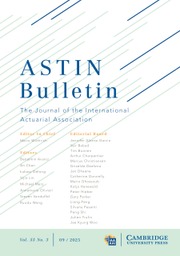Article contents
A practical application of credibility to experience rating plans for hospitalization and medical-surgical insurance
Published online by Cambridge University Press: 29 August 2014
Extract
This paper describes a rather simple application of credibility which was used to develop experience rating plans for Blue Cross and Blue Shield organizations in the United States. These are non-profit corporations which provide prepaid coverage for the cost of hospitalization and medical-surgical care. The benefits are in many instances full service benefits so that there is no additional cost to the subscribing member.
While coverage is being granted to individual applicants, the bulk of the unterwriting is composed of groups, that is employees of a given commercial entity. Since the plans are voluntary and, in many instances, the employer either acts only as collecting agent for his employees or else pays only a fraction of the premium, certain minimum participation percentages have been established to prevent anti-selection.
Because of the competion of Insurance Companies which have concentrated their efforts on larger and more profitable groups (especially those where the employer pays all of the premiums) it was early recognized that a uniform or “community” rate will result in a gradual loss of groups with good experience thereby requiring substantial increases in the average rates. The original program of experience rating which the author has developed for the Massachusetts Blue Cross in 1949 has been since adopted “mutatis mutandis” by a number of other Blue Cross and Blue Shield organizations.
- Type
- Astin Colloquium 1966 Arnhem Subject one
- Information
- Copyright
- Copyright © International Actuarial Association 1968
- 1
- Cited by


